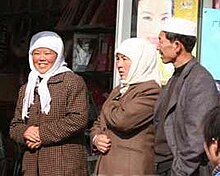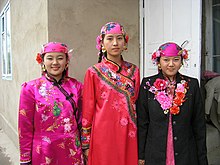This article needs additional citations for verification. (May 2021) |

Hui pan-nationalism refers to the common identity among diverse communities of Chinese-speaking Muslims (typically members of the Hui ethnic-cultural group). Hui pan-nationalism should be distinguished from nationalist sentiments by minority groups who are also Muslim such as those of the Uyghurs. These sentiments are grounded upon the Hui "zealously preserving and protecting their identity as enclaves ensconced in the dominant Han society."[1] In exchange for support during the Cultural Revolution, the Hui were granted high political participation. Hui pan-nationalism was one of the first sources of modern Chinese nationalism, influenced by Western, Japanese and Soviet influences.


Some of the various Chinese Muslim groups included under the Hui are the Hui, Dungans, and Panthays. Because the Uyghurs are not of Sinitic origin, but rather Turkic, they are not included.
- ^ C., Gladney, Dru (1996). Muslim Chinese : ethnic nationalism in the People's Republic. Council on East Asian Studies. ISBN 0-674-59495-9. OCLC 832762081.
{{cite book}}: CS1 maint: multiple names: authors list (link)
© MMXXIII Rich X Search. We shall prevail. All rights reserved. Rich X Search
